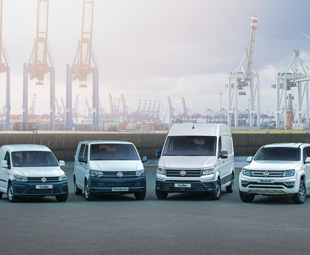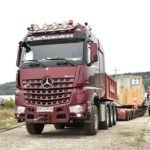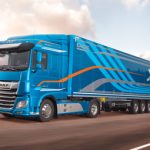Crazy for VW commercials, a tonne for Ford and Fuso ECanter nears global launch

Volkswagen Commercial Vehicles has reported the worldwide delivery of 286 800 vehicles thus far this year, representing an increase of 5,3 percent compared with the same period last year.
In Western Europe, vehicle deliveries increased by 4,3 percent to 196 600 vehicles. In Eastern Europe, 22 400 vehicles were delivered, corresponding to an increase of 17,6 percent.
In North America (Mexico) deliveries increased by an impressive 48,7 percent, with 6 400 unit sales. Deliveries in South America rose 16,1 percent to 23 000 vehicles, and in the Asia-Pacific region by 14,3 percent to 14 600 vehicles.
Three global markets returned negative figures. These were Africa (-14,2 percent to 7 400 vehicles) the Middle East (-15,1 percent to 16 200 vehicles) and Great Britain, (-2,3 percent to 26 700 vehicles).
Bram Schot, member of the Board of Management of Volkswagen Commercial Vehicles, responsible for sales and marketing, says: “We are very satisfied with the continued good performance of our sales situation and we would like to thank our customers for their continued confidence in our products.”
Each of the individual model ranges represented increased sales except for the Crafter, which declined by 8,9 percent; a performance attributed to the current model changeover.
A tonne for Ford
This year, Ford is celebrating 100 years of its first, purpose-built, one-tonne van – the Ford Model TT. The forerunner to the modern-day van and pickup, the Model TT was first launched in the United States of America, and later built at Ford’s Trafford Park factory in Manchester, England.
 The Model TT van was longer and stronger than the Model T car, it could seat two and, for a smoother ride, customers could choose modern air-filled rear tyres instead of solid rubber. Owners could also customise the chassis with a cargo bed to transport everything from letters to fuel.
The Model TT van was longer and stronger than the Model T car, it could seat two and, for a smoother ride, customers could choose modern air-filled rear tyres instead of solid rubber. Owners could also customise the chassis with a cargo bed to transport everything from letters to fuel.
“While in some ways today’s vans are a million miles from the Model TT, it’s amazing how they have come on. Fundamentally they do the same job they were designed to do 100 years ago – providing a flexible means of keeping businesses on the move,” comments Hans Schep, general manager, Commercial Vehicles, Ford of Europe.
The 100-year milestone comes as Ford prepares to launch 20 new plug-in hybrid (PHEV) Transit Custom vans on a 12-month trial in and around London. Among those taking part in the trial are the Metropolitan Police and British Gas, which will allow both Ford and the city of London to explore how electrified vans can contribute to cleaner air targets while boosting productivity for operators in urban conditions.
The Transit Custom PHEV van, planned for commercial introduction in 2019, is part of Ford’s $4,5 billion (R539,63 billion) investment into electrified vehicles by 2020.
Fuso ECanter nears global launch
It’s been seven years since Fuso presented the electrically powered Canter E-Cell prototype at the 2010 IAA show in Hanover, Germany. Four years later pre-series production for testing purposes commenced.
Now, following the start of Japanese production at the Kawasaki plant during July, Mitsubishi Fuso Truck and Bus Corporation (MFTBC) has celebrated the beginning of production for European and American markets.
MFTBC has enjoyed the support of the Portuguese government since 2010, during which time the eCanter – the world’s first all electric light-duty truck – has been developed. The new vehicle will be built in line with the conventional Fuso Canter truck in Tramagal, Portugal.
The Tramagal plant produces variations of the Fuso Canter for around 30 European countries.
Marc Llistosella, president and CEO of MFTBC and head of Daimler Trucks Asia, says: “From now on we can address the growing demand for emission-free delivery trucks in megacities. We have already received the first customer orders and will mark the global launch of this truck in one of the most iconic megacities – New York – this September.”
The eCanter has a range of 100 km and a load capacity of two to three tonnes – depending on body and usage. The vehicle’s electric powertrain contains six high-voltage lithium-ion battery packs with 420 V and 13,8 kWh each. In comparison with a conventional diesel truck, it offers claimed savings on operating costs of up to €1 000 (R15 522) per 10 000 km.
Published by
Focus on Transport
focusmagsa




